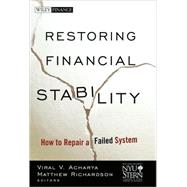
Note: Supplemental materials are not guaranteed with Rental or Used book purchases.
Purchase Benefits
What is included with this book?
Viral V. Acharya is Professor of Finance at New York University Stern School of Business and London Business School. He is Academic Advisor to the Federal Reserve Banks of New York and Philadelphia and Academic Director of the Coller Institute of Private Equity. Professor Acharya earned a Bachelor of Technology in computer science and engineering from the Indian Institute of Technology, Mumbai, and a PhD in finance from NYU Stern. He lives in New York City with his wife and son.
Matthew Richardson is the Charles E. Simon Professor of Financial Economics and the Sidney Homer Director of the Salomon Center for the Study of Financial Institutions at New York University Stern School of Business. Professor Richardson received his PhD in finance from Stanford University and his MA and BA in economics concurrently from the University of California at Los Angeles. He lives in New York City with his wife and three children.
| Foreword | p. xi |
| Acknowledgments | p. xiii |
| Prologue: A Bird's-Eye View The Financial Crisis of 2007-2009: Causes and Remedies | p. 1 |
| Causes of the Financial Crisis of 2007-2009 | p. 57 |
| Mortgage Origination and Securitization in the Financial Crisis | p. 61 |
| How Banks Played the Leverage Game | p. 83 |
| The Rating Agencies: Is Regulation the Answer? | p. 101 |
| Financial Institutions | p. 117 |
| What to Do about the Government-Sponsored Enterprises? | p. 121 |
| Enhanced Regulation of Large, Complex Financial Institutions | p. 139 |
| Hedge Funds in the Aftermath of the Financial Crisis | p. 157 |
| Governance, Incentives, and Fair Value Accounting Overview | p. 179 |
| Corporate Governance in the Modern Financial Sector | p. 185 |
| Rethinking Compensation in Financial Firms | p. 197 |
| Fair Value Accounting: Policy Issues Raised by the Credit Crunch | p. 215 |
| Derivatives, Short Selling, and Transparency | p. 229 |
| Derivatives: The Ultimate Financial Innovation | p. 233 |
| Centralized Clearing for Credit Derivatives | p. 251 |
| Short Selling | p. 269 |
| The Role of the Federal Reserve | p. 277 |
| Regulating Systemic Risk | p. 283 |
| Private Lessons for Public Banking: The Case for Conditionality in LOLR Facilities | p. 305 |
| The Bailout | p. 323 |
| The Financial Sector Bailout: Sowing the Seeds of the Next Crisis? | p. 327 |
| Mortgages and Households | p. 341 |
| Where Should the Bailout Stop? | p. 353 |
| International Coordination | p. 363 |
| International Alignment of Financial Sector Regulation | p. 365 |
| About the Authors | p. 377 |
| Index | p. 381 |
| Table of Contents provided by Ingram. All Rights Reserved. |
The New copy of this book will include any supplemental materials advertised. Please check the title of the book to determine if it should include any access cards, study guides, lab manuals, CDs, etc.
The Used, Rental and eBook copies of this book are not guaranteed to include any supplemental materials. Typically, only the book itself is included. This is true even if the title states it includes any access cards, study guides, lab manuals, CDs, etc.